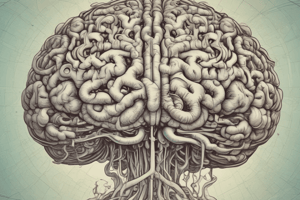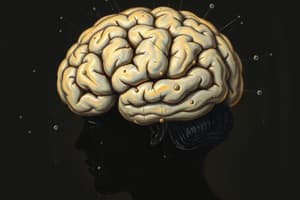Podcast
Questions and Answers
What does Vygotsky believe is a key component in children's self-regulation and problem-solving?
What does Vygotsky believe is a key component in children's self-regulation and problem-solving?
- Private speech (correct)
- Social play
- Telegraphic speech
- Egocentric speech
During the ages of 2 to 6, children's vocabulary typically increases to which of the following numbers of words?
During the ages of 2 to 6, children's vocabulary typically increases to which of the following numbers of words?
- 1,500 words
- 5,000 words
- 20,000 words
- 12,000 words (correct)
What is overgeneralization in the context of language development?
What is overgeneralization in the context of language development?
- Learning new words quickly
- Using more complex sentences
- Grouping objects based on characteristics
- Applying grammatical rules incorrectly (correct)
Which factor is NOT listed as a barrier to free play?
Which factor is NOT listed as a barrier to free play?
What does Body Mass Index (BMI) measure?
What does Body Mass Index (BMI) measure?
Which of the following is a recommended action for preventing childhood obesity?
Which of the following is a recommended action for preventing childhood obesity?
Which factor can contribute to childhood obesity?
Which factor can contribute to childhood obesity?
How does Vygotsky's approach to cognitive development differ from Piaget's?
How does Vygotsky's approach to cognitive development differ from Piaget's?
What primarily contributes to the rapid growth of the brain during early childhood?
What primarily contributes to the rapid growth of the brain during early childhood?
Which hemisphere of the brain is primarily associated with language functions?
Which hemisphere of the brain is primarily associated with language functions?
During the Preoperational Stage, what does the term 'centration' refer to?
During the Preoperational Stage, what does the term 'centration' refer to?
What does Vygotsky's concept of the Zone of Proximal Development (ZPD) emphasize?
What does Vygotsky's concept of the Zone of Proximal Development (ZPD) emphasize?
What is a notable characteristic of the 'Intuitive Thought' substage in Piaget's Preoperational Stage?
What is a notable characteristic of the 'Intuitive Thought' substage in Piaget's Preoperational Stage?
Which of the following concepts critiques Piaget's understanding of children's cognitive capabilities?
Which of the following concepts critiques Piaget's understanding of children's cognitive capabilities?
What does the three-mountain task primarily test?
What does the three-mountain task primarily test?
What is referred to when discussing 'scaffolding' in the context of Vygotsky's theory?
What is referred to when discussing 'scaffolding' in the context of Vygotsky's theory?
Flashcards
Myelination
Myelination
The process of coating nerve fibers with a fatty substance, increasing communication speed between neurons.
Lateralization
Lateralization
The specialization of the left and right hemispheres of the brain for different functions.
Corpus Callosum
Corpus Callosum
The nerve bundle connecting the left and right hemispheres of the brain, improving communication between them.
Preoperational Stage
Preoperational Stage
Signup and view all the flashcards
Centration
Centration
Signup and view all the flashcards
Conservation
Conservation
Signup and view all the flashcards
Egocentrism
Egocentrism
Signup and view all the flashcards
Scaffolding
Scaffolding
Signup and view all the flashcards
Vygotsky's Sociocultural Theory of Cognitive Development
Vygotsky's Sociocultural Theory of Cognitive Development
Signup and view all the flashcards
Piaget's Cognitive Development Theory
Piaget's Cognitive Development Theory
Signup and view all the flashcards
Overgeneralization in Language Development
Overgeneralization in Language Development
Signup and view all the flashcards
Categorization in Language Development
Categorization in Language Development
Signup and view all the flashcards
Fast Mapping in Language Development
Fast Mapping in Language Development
Signup and view all the flashcards
Body Mass Index (BMI)
Body Mass Index (BMI)
Signup and view all the flashcards
Obesity
Obesity
Signup and view all the flashcards
Childhood Obesity
Childhood Obesity
Signup and view all the flashcards
Study Notes
Brain Development in Early Childhood
- Brain rapidly grows to 20-25% of adult weight during ages 2-6.
- Myelination speeds up neuron communication, improving motor skills.
- Brain hemispheres specialize (lateralization): left for language, right for emotions.
- Corpus callosum myelination enhances communication between hemispheres, leading to handedness.
Piaget's Preoperational Stage
- Stage lasts from age 2 to 7, with two sub-stages.
- Symbolic Function (Ages 2-4):
- Centration: Focus on one aspect.
- Conservation: Inability to understand unchanging properties.
- Egocentrism: Inability to see from others' perspectives.
- Animism: Belief inanimate objects have human qualities.
- Irreversibility: Changes are not reversible.
- Intuitive Thought (Ages 4-7):
- Curiosity increases, but reasoning is intuitive.
- Artificialism: Explaining natural events as human actions.
- The three-mountain task demonstrates egocentrism by testing children's understanding of different perspectives.
Criticisms of Piaget's Theory
- Underestimates children's abilities.
- Lacks cultural considerations.
Vygotsky's Theory of Cognitive Development
- Emphasizes social learning.
- Zone of Proximal Development (ZPD): Tasks children can perform with guidance.
- Scaffolding: Support from more knowledgeable individuals.
- Language is key for cognitive development, especially private speech (seen as self-regulation).
- Vygotsky's approach contrasts with Piaget's emphasis on developmental stages and maturation.
- Vygotsky emphasizes social interaction while Information Processing focuses on internal cognitive processes.
Language Development (Ages 2-6)
- Vocabulary rapidly increases from 500 words at age 2 to over 12,000 by age 6.
- Telegraphic speech (simple two-word phrases) progresses to complex sentences.
- Overgeneralization: Applying grammatical rules to irregular cases (e.g., "runned").
- Categorization: Grouping objects by shared traits.
- Fast mapping: Learning new words quickly.
Barriers to Free Play
- Limited free time due to structured activities.
- Screen time replaces physical play.
- Lack of green spaces and unsafe/inaccessible play areas.
- Parental fear of abduction/injury.
- Social and economic factors.
- Video games lack the creativity and physical activity of free play.
Childhood Obesity and BMI
- Body Mass Index (BMI) measures body fat.
- Childhood obesity is linked to psychological and chronic health risks (e.g., depression, diabetes, heart disease, asthma).
- Prevention involves healthy eating, promoting physical activity, limiting screen time, and family support.
Studying That Suits You
Use AI to generate personalized quizzes and flashcards to suit your learning preferences.




